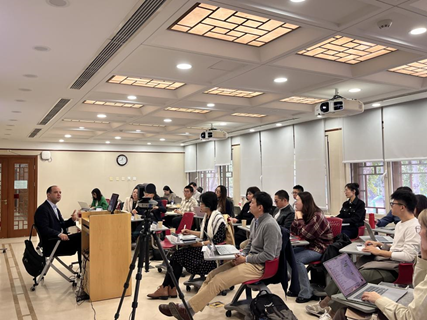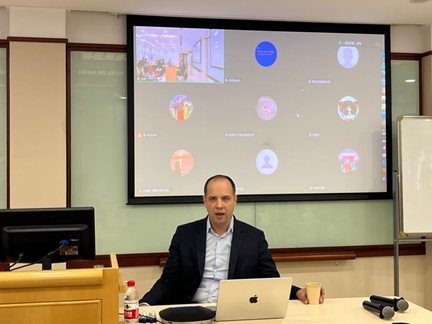
The 32nd seminar of the “Adventus Amicorum” series hosted by the Institute of Area Studies, Peking University (PKUIAS), was held on October 31, 2024. The keynote speaker was Ricardo Soares de Oliveira, Professor of the International Politics of Africa at the Department of Politics and International Relations, University of Oxford. His lecture, titled “Africa and the Global Economy: Assessing Major Trends”, offered in-depth insights into the topic. The seminar was moderated by Wang Jinjie, deputy secretary-general of the Centre for African Studies at Peking University. Discussants included Zhang Yongle, deputy director of PKUIAS and associate professor at the Law School; Liu Haifang, director of the Center for African Studies and associate professor at the School of International Studies; Yu Jia, senior operations officer and director of the Department of International Development Cooperation at the Institute of New Structural Economics; and Xu Liang, secretary-general of the Center for African Studies and associate professor at the School of International Studies. Nearly 200 students and faculty members attended the seminar, both in person and online.
Prof. Ricardo Soares de Oliveira began his lecture by underscoring the importance of situating the current state of African economies within their broader historical context. He highlighted how the “African Crisis” of the late 20th century contrasted sharply with the preceding “Glorious Thirty Years” of African economic development, serving as a microcosm of global economic turbulence that profoundly influenced the continent’s trajectory. According to his analysis, the crisis emerged from a confluence of factors, including transformations in the global economic environment, escalating external debt, economic models inadequately aligned with structural transformations in the global economy, fiscal deficits precipitating debt crises, and the inherent limitations of structural adjustment policies in facilitating substantive economic transformation.

Prof. Soares de Oliveira then examined the drivers and challenges of “Africa’s rise” in the 21st century. Africa’s economic growth during this period was propelled by increased demand for its resources from Asian economies such as China and India, which boosted commodity prices. Diversified investments by countries like China in manufacturing and infrastructure further supported development. Additionally, Western aid and access to international capital markets provided critical funding for growth. However, Africa’s overreliance on primary commodity exports, coupled with limited progress toward industrialization and economic diversification, perpetuated structural vulnerabilities. Global economic volatility, declining commodity prices, political instability, and high unemployment exacerbated social inequalities, limiting the continent’s potential for sustainable development.
In conclusion, Prof. Soares de Oliveira highlighted three major challenges that have shaped Africa’s economic landscape over the past decade, significantly hampering public policy objectives. First, the decline in commodity prices has prevented Africa from reaping the benefits of historical price surges, especially in the context of reduced global demand and waning energy needs from China. Second, the COVID-19 pandemic inflicted sustained economic shocks, despite the resilience demonstrated by African societies. Third, geopolitical transformations, particularly the intensification of US–China rivalry, have increased political pressure on African nations to navigate difficult choices among global powers. Nonetheless, Africa still holds considerable potential, particularly in the areas of energy cooperation and green transition.
During the discussion session, the moderator and four commentators shared their insights and posed questions regarding Prof. Soares de Oliveira’s lecture. Zhang Yongle drew a comparison between Africa’s and China’s historical experiences under the oppressive “concert of power” of colonial empires. He noted that the breakdown of the “concert of great powers” created a “weak link” in the colonial order, which provided opportunities for agency. He suggested that the current global transformations similarly offered African nations a chance to exercise their agency. Liu Haifang emphasized the need for an interdisciplinary approach in studying Africa’s economic development, advocating for broader considerations beyond commodity price fluctuations and the influence of international financial institutions. Yu Jia, drawing from her research and fieldwork, highlighted three key points for attention: First, Africa faces challenges related to “early internationalization” in its industrialization process, with insufficient infrastructure hindering progress. Second, within the context of geopolitical changes, the “flying geese” model may facilitate the relocation of Chinese manufacturing to Africa, thereby creating more opportunities for the continent. Third, while climate change poses significant challenges, Africa has the potential to leverage its abundant wind energy resources and advance digital transformation. She highlighted infrastructure improvement, foreign investment relocation, and climate action as key drivers for Africa’s economic growth.
Wang Jinjie concluded the seminar with a summary of the discussions, expressing his hopes for sustained exchange and collaboration in future seminars and research initiatives.


